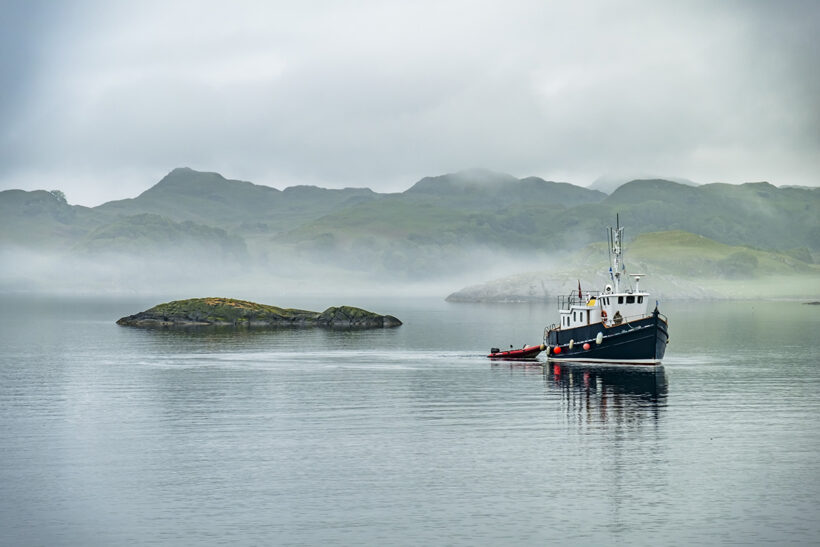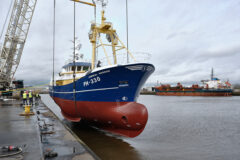The row over Protected Marine Areas (HPMAs) in Scotland reached new heights last week with a growing number of politicians and commentators urging the Scottish government to rein back on its plans to designate 10% of Scottish waters as HPMA in which all extractive activities would be prohibited
As well as a series of statements from organisations representing interests as diverse as anglers, wildlife tour operators and even a group of swimmers, the matter was discussed at length in Holyrood, and became one of the issues at stake as the deadline for voting in the SNP leadership election loomed.
Kate Forbes, one of the three candidates to become the next SNP leader and Scottish first minister, signalled a possible change of direction when she announced last week that she would scrap the current proposals – which are still out to public consultation – and instead commission a feasibility study on devolving marine protection and inshore fisheries powers to local authorities.
She labelled the current proposals ‘an example of how not to do government’.
Minister signals possible climbdown
Scotland’s minsiter for environment and land reform Máiri McAllan MPS faced a barrage of questions from MSPs across all political parties last week as the Scottish government proposals for 10% of all Scottish waters to be designated as HPMAs took a battering from an increasingly wide, and vocal, set of opponents.
“We are in the early stages of developing Highly Protected Marine Areas. Our consultation is ongoing, and we are seeking views on what they should look like and how they should be selected and implemented. Fishing communities should be reassured that their views will be heard as part of that consultation,” she told the MSPs.
“Just as I have tried to handle other similar matters, I give a cast-iron assurance that the process will engage broadly and deeply, including with all those who will be affected by the policy. I believe strongly in that approach.”
Rachael Hamilton, the Conservative shadow rural affairs spokesperson, summed up the questions from many MSPs, quoting during her intervention detailed concerns about the proposals, including those from the Western Isles Comharlie an Eilean Siar councillors, Tiree Community Trust, Shetland, and the wider concerns from the Scottish Fishermen’s Federation.
Highlands and Islands MSP Rhoda Grant said: “Banning sustainable fishing and marine activity that has safeguarded our waters and their future for generations is nonsensical. Harris Development Ltd summed up the views of many island communities when it said: “It is sheer arrogance for desk-bound ‘experts’ to suggest that we are not looking after our environment and protecting our stocks. The whole basis of the HPMA proposal is that locals are clearly not doing what they should, and need to be told how to look after it.”
Green Party MSP Ariane Burgess – who endeared herself recently to the entire population of Shetland with her comments about HPMAs in the Shetland Times – was one of the few defenders of the proposals, suggesting that evidence from Lundy Island, where a no-take zone has been established for many years, was that tourism revenue could replace lost fishing income.
The consultation on Scottish HPMAs was extended from its original March deadline to 17 April, giving the incoming first minister plenty of time in which to find wriggle room, or to rethink responses. Much will depend on the appetite of the winner in the leadership race to continue with, or build on, the Bute House Agreement that brought the Scottish Greens into government with the SNP, who without them have a minority at Holyrood.
After the debate, MSPs and MPs continued to question the science behind the 10% HPMA target, and the benefits that complete closure to all activities would have for conservation. Conservative MSP Finlay Carson said: “The Greens’ extremist views are risking the very future of Scottish fishing, without any substantial evidence that this will actually have a positive impact on conservation and marine life.”
Writing to cabinet secretary Mairi Gougeon, Banff and Buchan Conservative MP David Duguid raised a series of questions about the scientific basis of the proposals, and about baselines that would help scientists monitor any future benefits of closures.
SNP race: two leadership candidates remain silent
The intervention by SNP leadership candidate Kate Forbes last week on the HPMA proposals was welcomed by the SFF.
In her lengthy statement, which was highly critical of her own government’s proposals, Kate Forbes, who represents many fishing communities in her constituency of Skye, Lochaber and Badenoch, went on to say: “Local communities are often the ones most affected by changes in marine ecosystems, and they can provide valuable knowledge and insight into the health of local fish stocks and other marine resources – and a more tailored approach could also improve monitoring and enforcement.”
No EU country has implemented HPMAs, Kate Forbes said, adding that there is ‘no evidence’ to demonstrate that they achieve their aims. Her support for decisions on local fisheries management and conservation to be devolved to local communities and councils echoes the call last week from Comhairle nan Eilean Siar, the Western Isles council.
SFF chief executive Elspeth Macdonald said: “The SFF welcomes SNP leadership candidate Kate Forbes’ opposition to the introduction of HPMAs, and echoes her sentiment that the Scottish government’s proposals are a good example of how not to do government.
“We hope the other candidates – and indeed all politicians – recognise the complete lack of any robust ecological case for these stringent conservation measures on top of Scotland’s existing MPA network. Collectively, fishing risks being excluded from as much as half of Scotland’s waters by 2050.”
The other two candidates in the leadership election, Humza Yousaf and Ash Regan, who represent constituencies in Glasgow and Edinburgh, had not, as FN went to press, made public statements on the HPMA issue.
This story was taken from the latest issue of Fishing News. For more up-to-date and in-depth reports on the UK and Irish commercial fishing sector, subscribe to Fishing News here or buy the latest single issue for just £3.30 here.
Sign up to Fishing News’ FREE e-newsletter here.






